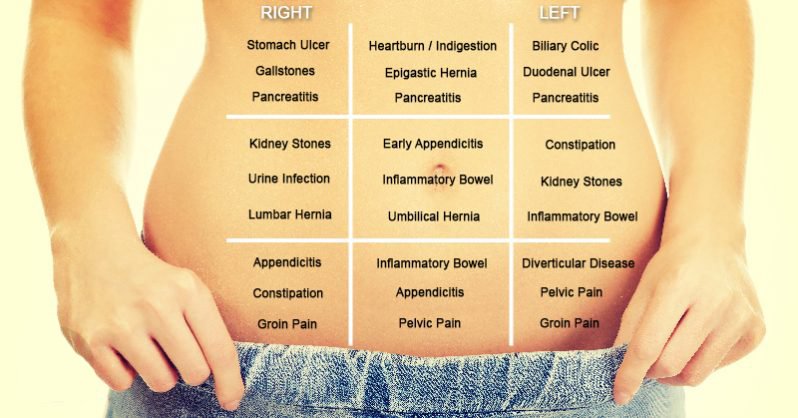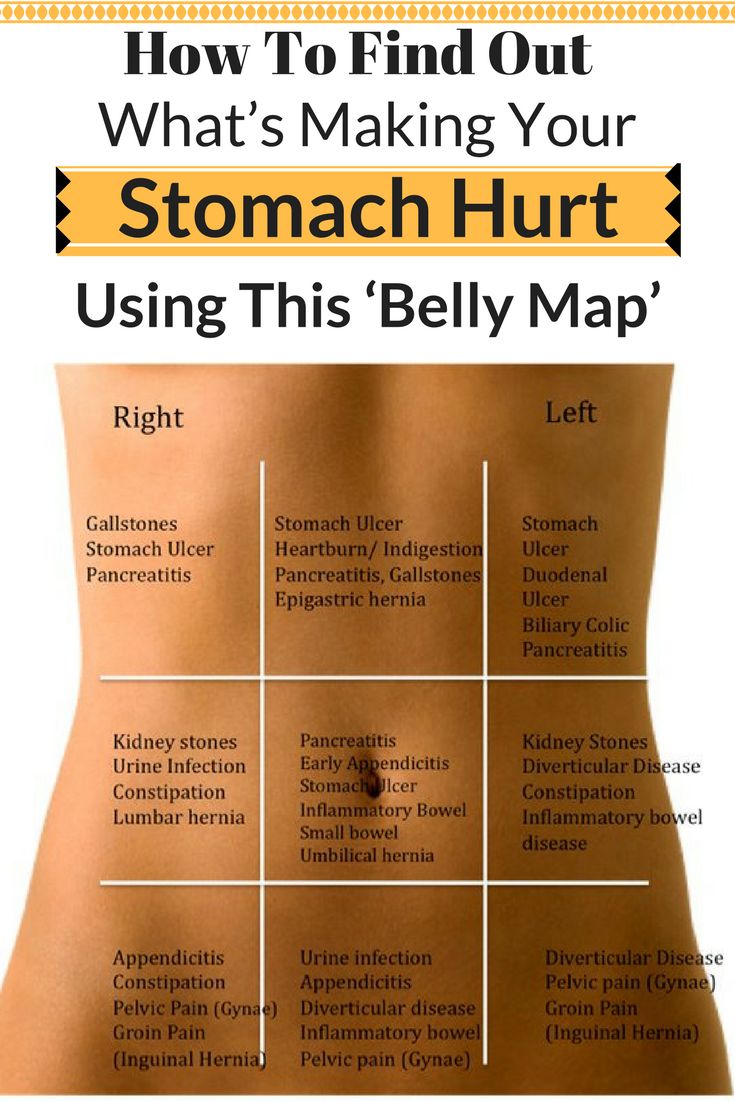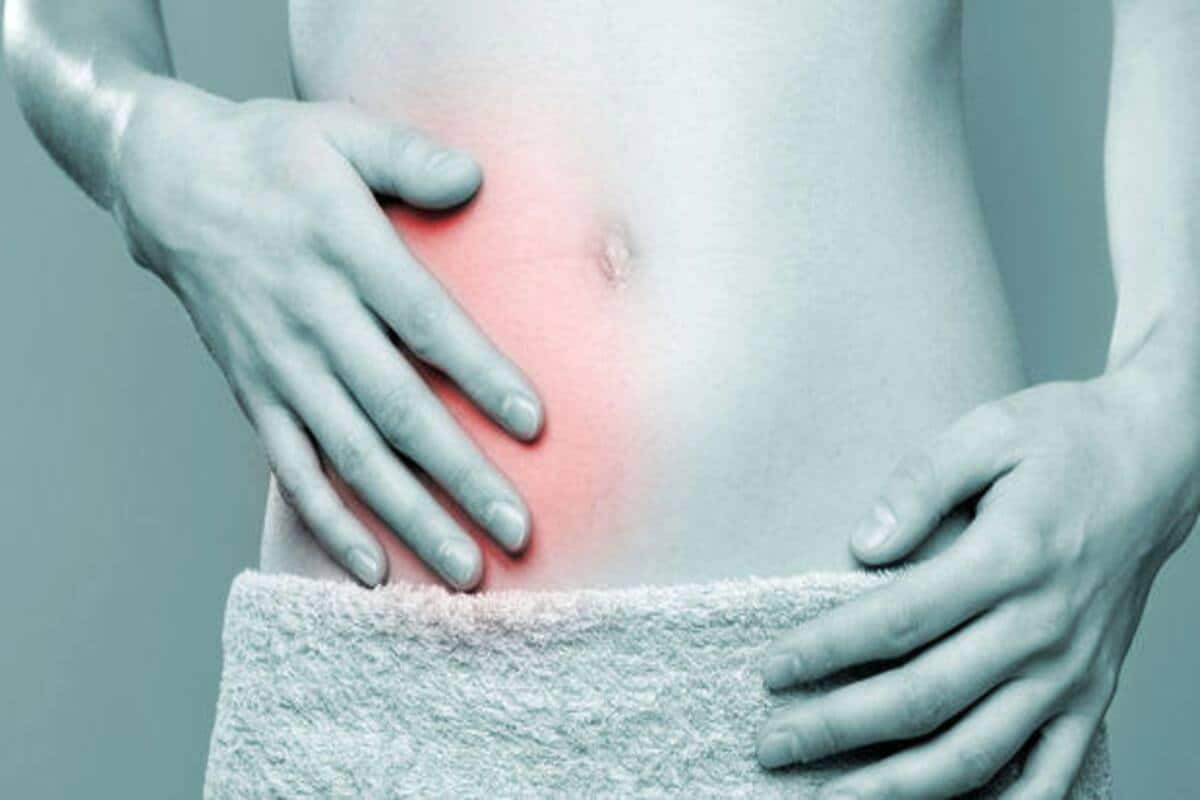What Other Symptoms Relate To Abdominal Pain
Pain in the abdomen may be experienced as aching, stabbing, burning, twisting, cramping, dull, or a gnawing pain.
The pain may also be accompanied by other symptoms, such as a feeling of discomfort in the abdomen, bloating, constipation, wind , belching , fever, heartburn, nausea, vomiting, fever, dehydration or loss of appetite
The pain might be steady or it might get stronger. It can be made worse or it can be improved by changes in posture or by coughing.
Describing the pattern and location of your symptoms to a doctor may help them in identifying the cause of your abdominal pain. These causes include:
- Peptic ulcer The pain is often felt in the upper abdomen, as a knife-like pain which goes through to the back.
- Gastro-oesophageal reflux disease The pain usually causes a central burning pain that develops just under the breastbone, and may rise upwards. It may be accompanied by belching.
- Appendicitis The pain usually starts near the navel before moving down to the lower right abdomen when it becomes more constant.
- Gallstones or gallbladder irritation The pain is felt in the upper right abdomen, back or right shoulder.
- Lower abdominal pain: Also referred to as lower stomach pain, it is probably coming from your bowel.
- Period pain This is usually a dull, cramping pain, felt low down, which may radiate through to the back.
Pelvic Floor Muscle Dysfunction
According to Rush university Medical Center, this condition is one that has forced some patients to manually remove stool or splint the rectum to defecate.
Since the pelvic muscles or the levator ani muscles are responsible for proper bowel movements, dysfunction of these muscles could lead to pain when passing stool. Therefore, different positions need to be assumed to be able to defecate.
How To Get Rid Of Poop Cramps & Bowel Movement Pain
Management of cramps of pain during bowel movement requires an interplay of different medications and non-pharmacological interventions. This interplay speeds up the process of healing while preventing the worsening of the condition and other complications that may arise.
There are home remedies that you may use but if the condition persists, do not insist. See a doctor or a gastroenterologist. Pregnancy could also lead to pregnancy-related constipation which leads to pain during bowel movements and therefore, this needs to be corrected.
Anti-cholinergic and antispasmodics:
Hysocine-S-butylbromide, hyoscyamine, dicyclomine, drotaverine and dicyloverine are good medications that treat colonic spasms that lead to cramping pain.
Also Check: Can Stomach Vacuum Lose Belly Fat
See Your Doctor As Soon As Possible If:
- your pain is no better after 2 hours of home care
- your abdomen is very painful
- your pain gets worse over time, or becomes sharper or stronger in one particular place
- your abdomen feels bloated or sticks out more than usual
- you cant stop vomiting
- you havent had a bowel motion or passed wind for 3 days
- youve lost your appetite
- there is blood in your vomit, urine or bowel motion, or vaginal bleeding that isnt a period.
You also need to see your doctor if you have other symptoms along with the pain such as fever or dizziness especially if those symptoms get worse over time or new symptoms develop.
Call Healthline if you are unsure what you should do.
How Do Doctors Find The Cause Of A Stomachache

To find the cause of a stomachache, doctors ask about:
- your symptoms
- illnesses you’ve had in the past
- health conditions that other family members have
Be honest with your doctor, even if a symptom seems embarrassing.
The doctor will do an exam and sometimes might order tests, such as an X-ray, ultrasound, or blood test. It all depends on what the doctor thinks is causing the problem.
You May Like: Why Does My Stomach Feel Full
Common Symptoms Of Cysts
The symptoms of a cyst depend on the location and size of the cyst. Many cysts will not produce any symptoms. Cysts associated with infection or cancers may cause a number of different symptoms. In some cases, such as benign cysts of the skin, a localized lump or swelling is the only symptom. If infected, the may be red and painful to touch.
Symptoms of a cyst can include:
- Abdominal distension, pain or cramping
- Bulging or protrusion of the eye
Know When You Have An Emergency
Lets assume you have ignored your stomach pain for too long, and now its getting worse. Without treatment, it might not get any better and rather worsen.
If you have recurring episodes of severe, intolerable pain, this is when you know you have to visit your doctor.
Look out for the following signs and rush to the hospital if you have to:
- Gasping
- Dizziness for a long time
- Mental confusion
Also Check: What Are Some Symptoms Of Stomach Ulcers
How Is The Cause Of The Abdominal Pain Diagnosed
Physical Examination
Physical examination will include a careful examination of the patient’s abdomen, heart, and lungs in order to pinpoint the source of the pain.
- The doctor will touch different parts of the abdomen to check for tenderness or other signs that indicate the source of the pain.
- The doctor may do a rectal exam to check for small amounts of blood in the stool or other problems, such as a mass or internal hemorrhoids.
- If the patient is a man, the doctor may check the penis and testicles.
- If the patient is a woman, the doctor may do a pelvic exam to check for problems in the uterus, Fallopian tubes, and ovaries.
- The doctor also may look at the patient’s eyes for yellow discoloration and in the mouth to be sure the patient is not dehydrated.
Laboratory Tests
Laboratory tests may or may not help to determine the cause of the abdominal pain. Combined with the information gained from the questions the patient was asked and the physical examination performed by the doctor, certain blood or urine tests may be ordered and could assist in determining the diagnosis.
Radiology Tests
Radiology studies of the patient’s abdomen can be useful, but are not always necessary or helpful.
- Occasionally, an X-ray will show air outside of the bowel, meaning that something has ruptured or perforated.
- An X-ray also can help diagnose bowel obstruction.
- Sometimes X-rays can show a kidney stone.
Ultrasound is a painless procedure useful in finding some causes of abdominal pain.
Diaphragm Spasm Or Pain
As weve seen that the diaphragm is what moves during your breathing. So, any problems affecting the diaphragm can make you feel stomach pain when breathing deeply. If part of your diaphragm is inflamed or injured, it can cause pain.
You might feel a cramp in your abdomen, too, if you have diaphragm pain. This may be accompanied by difficulty in breathing as well. You may even feel your stomach cramping up. Your diaphragm can be damaged by:
- Chest wall injury
- Excessive exercise without warming up
- Blows to the chest or abdomen
- Surgeries involving the diaphragm
You May Like: How To Avoid Stomach Pain
What Is The Medical Treatment For Causes Of Abdominal Pain In Adults
The patient’s treatment will depend on what the doctor thinks is causing the abdominal pain.
The patient may be given IV fluids. The doctor may ask the patient not to eat or drink anything until the cause of the pain is known. This is done to avoid worsening certain medical conditions or to prepare the patient in case they need to have surgery.
The patient may be given pain medication.
- For pain caused by bowel spasm, they may be given a shot in the hip, arm, or leg.
- If the patient is not throwing up, they may receive a drink that has antacid in it or pain medication.
- Although the patient’s pain may not go away completely, they have the right to be comfortable and should ask for pain medicine until they are made comfortable.
Do Hemorrhoids Cause Stomach Pain
Ask U.S. doctors your own question and get educational, text answers â itâs anonymous and free!
Ask U.S. doctors your own question and get educational, text answers â itâs anonymous and free!
HealthTap doctors are based in the U.S., board certified, and available by text or video.
Read Also: What Do Hemorrhoids Look Like On The Outside
You May Like: How To Lose Post Menopause Stomach Fat
Signs And Symptoms Of Abdominal Pain
Abdominal pain may take several different forms. In addition to how severe it is, abdominal pain can be described in the following ways:
Generalized Pain This refers to pain felt in more than half of your abdominal area, and is typical of stomach viruses, indigestion, or gas as the cause of your pain.
Localized Pain This refers to pain felt in just one area of your abdomen, and is typical of a problem with an organ like your stomach, appendix, or gallbladder as the cause of your pain.
Cramping This type of pain come and goes, or changes in its severity or perceived position in your abdomen. Cramping is rarely serious and is typical of gas, passing a stool, or menstruation as the cause of your pain.
Colicky Pain
Its important to call your doctor if your abdominal pain is so severe that you cant move without feeling more pain, or sit still in a comfortable position.
- Fever
- Nausea and vomiting that doesnt resolve
- Weight loss
- Abdomen very tender to touch
- Swollen abdomen
Why Does Wine Make Your Chest Hurt

By far the most common cause of chest discomfort after drinking wine is its alcohol content. However, sometimes other ingredients might also cause symptoms:
- Alcohol: Alcohol in wine increases blood pressure that might cause atrial fibrillation. The heart rate increases without providing sufficient blood to the body, leading to chest pain.
- Sulfites: Those who are sensitive to sulfites might experience a wide range of health issues after drinking wine. Skin problems, asthmatic reactions, chest and abdominal pains are all possible symptoms.
- Tannins: Tannins in wine can also trigger digestive problems. Those who are sensitive to tannins might experience stomach pain, nausea, sometimes even chest pain.
- Sugar: A glass of sweet dessert wine can contain as much as 8g of sugar. Long-term overconsumption of sugar is associated with serious health risks. On top of that, some people might have gas after sugar intake, which might increase stomach pressure and cause chest pain.
Related:
Read Also: How To Cure Stomach Ache For Kids
What Are The Potential Complications Of A Perforated Bowel
A perforated bowel can lead to serious complications, including peritonitis and sepsis. Both of these conditions can quickly become fatal. Mortality increases dramatically the longer treatment is delayed. In fact, sepsis kills up to 30% of its victims. It is especially dangerous for the elderly, very young children, and people with chronic medical conditions.
Fortunately, surgery to repair a perforated bowel is successful in most cases. But it relies on rapid recognition of a problem and prompt medical care. Remember TIME , do not delay seeking care, and tell the medical provider you are concerned about sepsis. It is better to be mistaken than to gamble by postponing treatment.
Why Does My Stomach Hurt When I Poop How To Get Rid The Pain
At times you experience stomach pains when you poop that extends to the abdomen and at times in form of a tense pressure. It is hard to fathom its source unless a thorough investigation is conducted to identify the underlying cause. It is usually important to address this with a doctor. More particularly, gastroenterologists are involved with such specificity.
Recommended Reading: Can Stomach Gas Cause Back Pain
How To Avoid Hemorrhoid Pain While You Sleep
If you want to avoid hemorrhoid pain at night, you have to sleep in the right position. Sleeping on your stomach is the best position for sleeping when suffering from hemorrhoid pain. You can even put a pillow under your hips in order to elevate your posterior, which takes more pressure off your hemorrhoids.
If you canât sleep on your stomach for whatever reason, then sleeping on your side is an effective compromise. If you have extra pillows, position them around your body to prevent yourself from rolling over onto your back while you sleep. Otherwise, you could wake yourself up in the middle of the night with fresh hemorrhoid pain.
Sleeping on your back is the worst position to sleep in. It puts too much pressure on the pelvic floor, exacerbating the pain and severity of your hemorrhoids. If you absolutely cannot avoid sleeping on your back, try putting a pillow under your knees. This can help alleviate pressure on your pelvic floor, which can make hemorrhoid pain worse.
Water Quality And Stomach Ache
Drinking safe and clean water is essential to remaining healthy. However, the water in our taps usually comes from municipality distribution. There can be many impurities that are missed during the initial water treatment, or the water can pick up unwanted contaminants due to unmaintained and old water pipes.
The following can be some water quality-related issues that are causing your stomach ache:
Recommended Reading: What Foods Help Neutralize Stomach Acid
What Happens When A Hemorrhoid Bursts
When a thrombosed hemorrhoid becomes too full of blood, it can burst. This can lead to a brief period of bleeding. Keep in mind that a thrombosed hemorrhoid will usually be very painful before it actually bursts. Once it bursts, youll likely feel an instant sense of relief due to the release of extra pressure from built-up blood.
If you have some bleeding but continue to also have pain or discomfort, you likely just have a bleeding hemorrhoid, rather than a burst hemorrhoid.
Learn more about bleeding hemorrhoids and how to handle them.
Lower Left Abdominal Pain & Wine
Wine might cause abdominal pain in the lower left part of the abdomen. A common cause of this is diverticulosis.
Diverticular disease is the outpouching of the intestinal mucosa due to weakness in the muscle. It is associated with bloating and constipation that causes left-sided abdominal pain.
Alcohol is a risk factor for diverticulosis, especially in aged people.
Recommended Reading: What Can Cause Really Bad Stomach Pain
Stomach Hurts After Drinking Wine
The alcohol content of wine might trigger stomach pain for several reasons. People with certain health issues are more at risk.
Wine contains alcohol that irritates the mucosal lining of the stomach and stimulates acid production. Increased acid production leads to the production of inflammatory cytokines that causes inflammation of the mucosal lining of the stomach and induce pain.
Related:
These are the common causes of abdominal pain after drinking wine:
- alcoholic gastritis
- dehydration
Does It Hurt When You Push On Your Stomach In Early Pregnancy

Tummy twinges, pinching and pulling Sometimes referred to as abdominal twinges, these tingles are nothing to worry about. Layla Rumble, midwife at The Portland Hospital, which is part of HCA Healthcare UK, said, Abdominal twinges and mild pains are very common during pregnancy and usually nothing to worry about.
Recommended Reading: What To Eat To Help With Stomach Pain
How Is Abdominal Pain Diagnosed
The cause of abdominal pain is diagnosed based on your symptom history, a physical examination, and testing, if needed. Your doctor is likely to ask you questions about the characteristics of your pain, and whether you have any underlying physical or mental health conditions that could be contributing to your abdominal pain.
Questions from your doctor may address the following aspects of your abdominal pain:
- Where its located
- Whether its dull, stabbing, burning, or cramping
- Whether it comes and goes
- When you experience or notice it most
- Whether it radiates outward to other areas of your body
- How long youve had it
- Whether any activities or actions seem to make it worse or better
Your doctor may also ask about your overall health history, any recent injuries, and whether you might be pregnant.
- Blood, urine, or stool tests
- X-ray of the abdomen
- Computerized tomography scan of the abdomen
- Barium enema
- Endoscopic procedures
- Electrocardiogram
What Is Abdominal Pain
Abdominal pain may be felt anywhere between the chest and groin region of your body. The pain may be generalized, localized, or it may feel like cramps in your belly. If you have cramping or discomfort in your stomach, it may be due to gas, bloating, or constipation. Or it might be a sign of a more serious medical condition.
Colicky pain in the abdomen region comes and goes. One moment, you may feel fine, but the next, you may experience sharp, sudden pain in your abdomen. Kidney stones and gallstones are often the cause of this type of pain.
Many conditions can cause abdominal pain. But the main causes are:
- infection
Mild abdominal pain may go away without treatment. For example, if youre experiencing abdominal pain because of gas or bloating, it may simply need to run its course.
But in some cases, abdominal pain may warrant a trip to the doctor.
You should seek immediate medical care if the pain is so severe that you cant sit still or need to curl into a ball to get comfortable, or if you have any of the following:
- unexplained weight loss
If you dont already have a gastroenterologist, the Healthline FindCare tool can help you find a physician in your area.
Recommended Reading: What To Do For Bad Stomach Pain